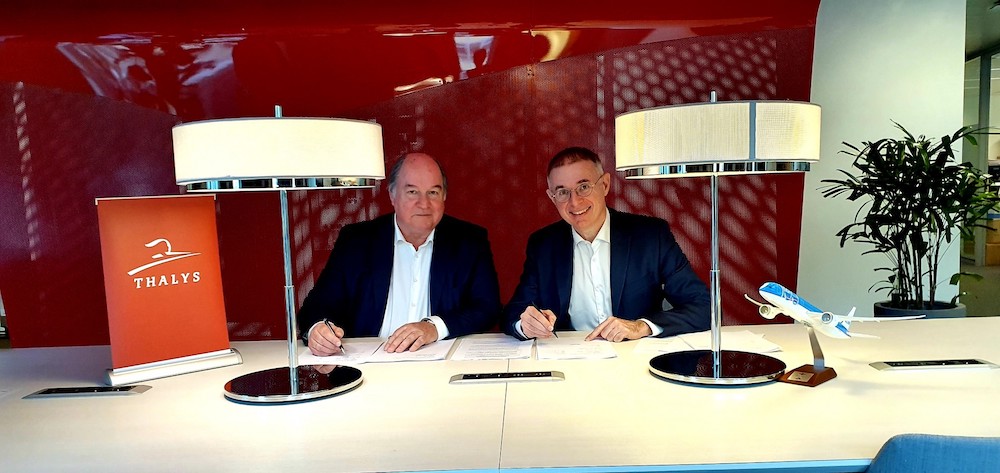
(TAN): KLM Royal Dutch Airlines and Thalys have signed an agreement to develop their joint AirRail product with a view to making it more appealing to customers. The aim is to increase the number of passengers with connecting KLM flights at Amsterdam Airport Schiphol who travel from Brussels – and back – by train, the airline said.
For some time now, KLM has offered transfer passengers the option of boarding a Thalys high-speed train instead of a flight on the Brussels-Schiphol leg of their journey (or vice versa). Before the Covid-19 pandemic, 20–25% of these passengers (some 36,000 customers) chose this option. KLM and Thalys would like to increase this percentage, and KLM is consequently purchasing enough seats from Thalys, which makes one of its daily services between Brussels and Schiphol redundant. Customers are now welcome to book these seats on KLM.com for travel dates starting July 17, 2022.
[ALSO READ: Canopy by Hilton New Orleans Downtown opens]
It is not enough to simply make these train seats available, however. Transfer passengers have specific demands and the majority continue to opt for air-air transfer. That is why KLM and Thalys have decided to take the next step in developing their AirRail product, in keeping with the Dutch government’s Action Agenda for Rail and Aviation (Actieagenda Trein en Luchtvaart), dating from 2020.
What are KLM and Thalys planning to do?
Several criteria vital to the success of any replacement rail service have been defined and are endorsed by both the railway and airline sectors:
1. International trains must stop at Schiphol.
2. Air and rail arrivals and departures must be coordinated.
3. Airline and railway IT systems must be able to communicate with each other (e.g. for check-in, boarding, rebooking passengers in the event of disruption and so on).
4. Railway baggage handling must also be integrated, with trains having secure baggage compartments and with efficient baggage transfer procedures at Schiphol to ensure speed and convenience.
5. Passengers arriving at Schiphol by rail must have a separate transit route to the gate.
[ALSO READ: SAS signs charter agreement with Apollo worth USD 102 million]
Thalys already meets the first two criteria on the Schiphol-Brussels route. With respect to criteria 3, communication between IT systems, KLM and Thalys have found a workaround: the seats KLM purchases on Thalys trains are entered manually into KLM’s IT system, ensuring that customers who travel by rail enjoy the same level of service and the same efficient communication as those who opt for air travel.
This means that customers can check in and receive boarding passes at Brussels-Midi/Zuid railway station for their entire journey, both rail and air. KLM updates and rebooks customers in the event of disruptions in both rail and air services. KLM also offers customers information on transfers and on how to prepare for their journey. KLM and Thalys will ask their international customers to help them evaluate this temporary workaround.
Passengers should be able to hand over checked baggage at the railway station for forwarding to their final destination. Ideally, they should also have a separate transit route at Schiphol to ensure a smooth transfer. That is not yet the case. KLM will be discussing how best to meet these criteria with the relevant parties.
[ALSO READ: MSC Meraviglia set to be based out of New York, a first for the cruise company]
“KLM is committed to reducing the impact of its operations on our living environment. In addition to upgrading our fleet, replacing more jet fuel with sustainable aviation fuel (SAF) and improving our operational efficiency, we aim to reduce emissions by offering the train as an alternative to short-haul flights. Developing the AirRail product in partnership with Thalys is a step in the right direction, and linking our two networks at Schiphol for quick, efficient and convenient transfers is a positive move. Similar to our partnerships in the airline industry, our cooperation with Thalys reflects our commitment to intermodality,” said Boet Kreiken, EVP Customer Experience, KLM.
“Intermodality between air and rail plays an important role in achieving our growth ambitions. The extension of the cooperation with KLM fits perfectly with this ambition. Together we are creating a product that combines rail and intercontinental flights to meet our customers’ expectations of an environmentally friendly alternative,” said Bertrand Gosselin, CEO of Thalys.




